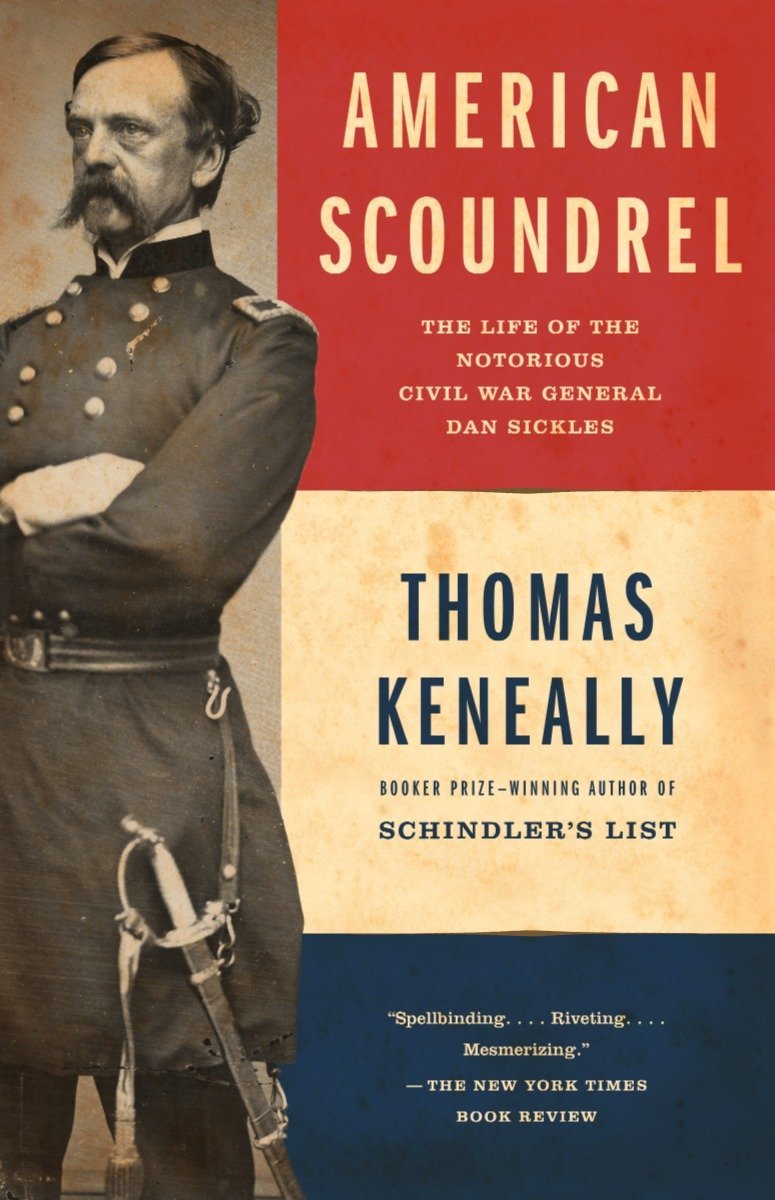One of the coolest(?) party tricks anyone who has studied history learns to perform is breaking out the stories: the did-you-knows and let-me-tell-you-abouts that almost inevitably gravitate towards the weird, unexpected, bemusing, and surprisingly relatable. Reveling in the absurdity of the past, perhaps, helps us feel a bit better about the absurdity of the present, through both schadenfreude and a sense of kinship with our distant ancestors that, well, we all have to deal with this shit. And, of course, for the historical storyteller, we can bask in the curious delight we bring to others, and feel as though our expertise is put to at least one tiny social good– but I’m straying from the point. This is actually a post about how my girlfriend, Carolyn, and I tried to read the biography of a notoriously bad-boy Civil War general as a bonding experience.

It all, of course, started with one of Those Stories: my effort to delight and entertain her with the story of General Daniel Edgar Sickles. General Sickles’ life contains many highlights which make it perfect for one of Those Stories: a protracted slow-motion train wreck which, somehow, against all odds, manages to arrive at its destination. As a young U.S. Congressman, he was the first man in U.S. history to be acquitted of a murder charge on the plea of temporary insanity. It was one earned after gunning down the son of Francis Scott Key, of Star-Spangled fame, in the middle of Lafayette Square after discovering the younger Key’s affair with his wife– despite himself being a serial cheater. In the true fashion of a wealthy and well-conducted 19th century bon vivant, Sickles failed upwards, and less than three years later found himself a general in the Union Army with the arrival of the Civil War. By the spring of 1863, Sickles was the commander of the army’s Third Corps, and entered legend during the Battle of Gettysburg where he infamously abandoned his defensive position in order to engage the enemy more directly, costing him his right leg (which is now part of the National Museum of Health and Medicine’s collections!). Naturally for this distinguished career, Sickles was awarded the Medal of Honor and appointed Ambassador to Spain, where he allegedly conducted an affair with their Queen. In 1914, at the end of his long life, Sickles had risen to a place of prominence among Civil War veterans owing to his boisterous personality and indefatigable self-promotion, leading efforts to memorialize the Gettysburg battlefield and appropriate funds for the construction of monuments– which he promptly embezzled.
And those are, as I said, really just the highlights.

Needless to say, Carolyn was absolutely delighted with the sheer absurdity as a man so “extra.” Right around that same time we had been discussing a mini household book club where we’re both read the same book and discuss it together– and Dan seemed like the perfect subject to start with. So, after a little digging, I uncovered American Scoundrel: The Life of the Notorious Civil War General Dan Sickles, by Schindler’s List author Thomas Keneally. With that literary pedigree and decent reviews, it was an easy buy.
I read and finished it first, and found the book to be good, but certainly no Schindler’s List. While its original 2002 reviews lavished Scoundrel in dramatic terms like “panoramic,” “entertaining,” and “flawless,” I did, in fact, find some flaws in the narrative: namely, an uneven narrative pace and scant treatment of the more mundane aspects of Sickles’ life. Keneally’s novelist spirit is clear in this sense, as he hones in on the dramatic and quickly bypasses the rest. Still, he must be credited for not shying away from the minutiae of 1850s Tammany Hall Democratic politics– which, as a political junkie, I did find particularly enjoyable.

The Sickles-Barton affair, however, is the primary incident which Keneally focuses the narrative as Keneally slowly unveils not only a portrait of Daniel Sickles, but of his victimized wife, Teresa, who herself was a remarkable woman: the highly educated, multilingual scion of a family of Italian musicians who charmed Washington society, despite her husband’s antics. Yet, for all of Sickles’ well known philandering, the standards of the time relegated Teresa to public shame and rejection as Sickles rode off to war. To this point, Keneally concludes Scoundrel with the sincere hope that, if he has helped to invoke the “gentler and pleasant spirit of Teresa” upon the pages and in the minds of his readers, then “the author is happy.”
To this point, I find the publisher’s excerpt of the Houston Chronicle’s review of Scoundrel to be most apt: “A fascinating look at a time when powerful men could get away with virtually anything.” Sickles’ story is audaciously unbelievable and funny given the distance of time and its reduction to “Let me tell you abouts,” but much more sobering when compared against that very same sentiment long before and still after Sickles’ time and into the present and the life of his now-forgotten wife. In this sense, I, as the original storyteller in my own couples’ descent into the Sickles Story, am perhaps complicit in his Houdini act of escaping consequences, perpetuating his charming audacity across the ages.
Carolyn ultimately did not finish the book, finding little of interest in the Tammany Hall intrigue that I drank in, and finding Sickles’ actions, rightfully, fully and utterly despicable. At first I was disappointed that we wouldn’t succeed in our first shared book club– but in retrospect, find something poignant in her choice. It’s one I wonder if Keneally, given his great sympathy for Teresa, would support, even as the author.
Sickles was a cheater who became famous as the perceived victim of adultery; a murderer who faced no penalties; a war hero most known for nearly losing its most famous battle; and an advocate for veterans who stole funds for their memorialization. His long, depraved story is a natural-born script for a scathing satire of American history, norms, and double-standards: a biting reflection on the destructive power of privilege when wielded by an ambitious man. If you’re out there, Mr. Waititi, I think you should take a look at this.

If you visit Gettysburg today, you’ll find monuments to nearly every leading general who fought there– but no Sickles. Monument embezzlement will do that to you. There is a Sickles Avenue, at least. For his role in advancing the legislation to preserve the battlefield, however – having returned to Congress following his stint as Ambassador to Spain – Sickles allegedly considered the “whole damn battlefield” to be his personal monument. This legacy, and his role as the post-war military governor of North and South Carolina, where he aggressively implemented Reconstruction policies, complicate his scoundrel reputation. He remains mostly remembered, though, in the Sisyphean debates of Civil Warriors who endlessly relitigate the value and consequences of his actions at Gettysburg. As in those debates, it’s far easier to see the blundering audacity in Sickles’ life– but despite it all, it is perhaps to the country’s benefit that he lost only his leg on the battlefield.
Next time, we’ll probably pick a book with less Sickles, though, and more Teresa.
